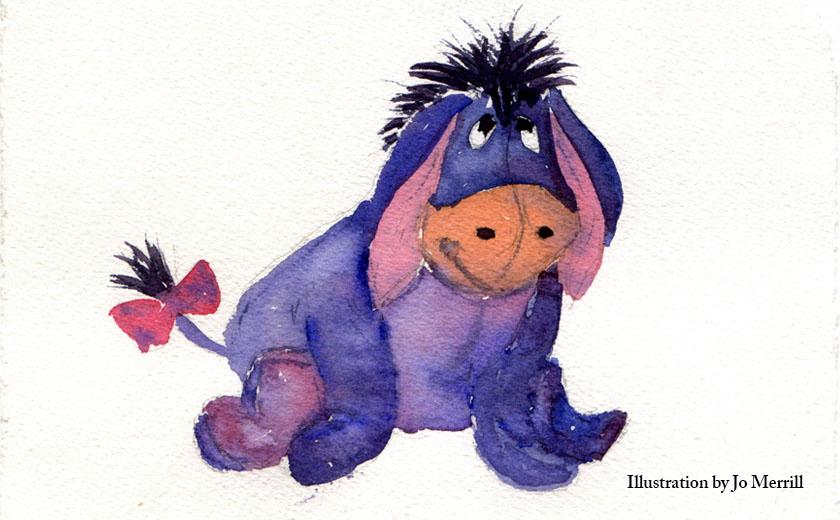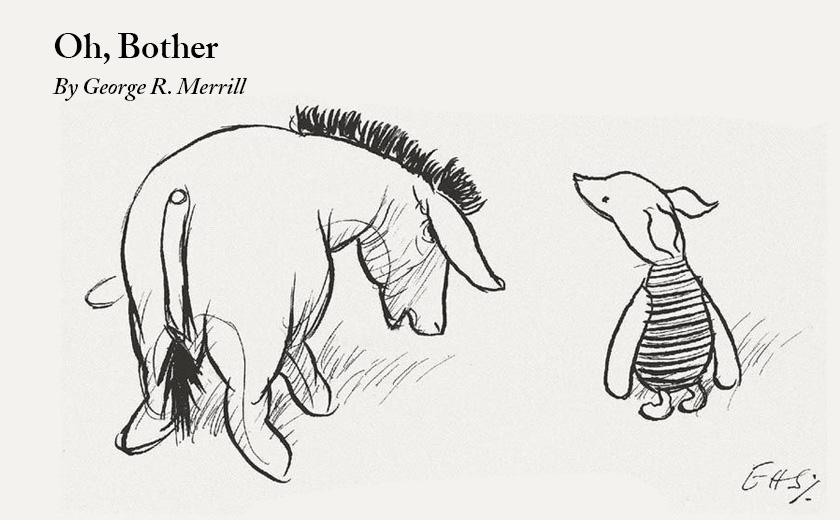My wife calls me ‘Eeyore’ when she’s feeling cutesy. Many of you will remember the children’s classic, Winnie the Pooh. Eeyore was the sad donkey who always lamented the loss of his tail. He’s always searching somewhere looking for it.
 She calls me Eeyore since I tend toward a melancholic disposition and usually see the glass as half empty. Another reason is that I lose things all the time. The glasses I wore on my nose only seconds before seem to disappear, even though I have not moved but a foot or so from where I last had them. I wish I could attribute this tendency to aging; in fact, it’s been an unfortunate character trait as long as I can remember.
She calls me Eeyore since I tend toward a melancholic disposition and usually see the glass as half empty. Another reason is that I lose things all the time. The glasses I wore on my nose only seconds before seem to disappear, even though I have not moved but a foot or so from where I last had them. I wish I could attribute this tendency to aging; in fact, it’s been an unfortunate character trait as long as I can remember.
One of my grandchildren visiting at the house one year commented on all the little stuffed Eeyores about the house. The picture accompanying this essay my wife painted for my birthday. I told my granddaughter that the Eeyors were gifts from Gramma Jo – she gets a kick out of reminding me that I often lose my tail. My grandchild, perplexed, defended me saying that Gramma Jo was just being silly; “You don’t have a tail.”
“Yeah,” I told her, “Now you can see what she means.”
Recently I was idly thumbing through some old Golden Books we kept for our grandchildren to read to them when they were small. Occasionally I’ll read some when my imagination sags and I’m at a loss for ideas. Their innocence often cuts through complex issues and illuminates significant things in a playful way. I picked up a book at random, called, “Just Be Nice . . . and help a friend.” It was all about Eeyore and his unending search for his lost tail.
The story begins with a sad looking Eeyore who wakes up to find his tail missing. To make a long story short, Eeyore sets off to find his tail, imploring as many of his friends as he sees to aid him in the search. They’re all too busy: Pooh was collecting honey, Rabbit was gardening and couldn’t get away, Piglet and Owl were busy and Tigger and Roo were, as we all remember, always on the move, somewhere. Eeyore strikes out. “Oh, bother,” he laments.
Totally discouraged, Eeyore goes home, paints his house gray to fit his dejected mood and to hide from friends the way depressed people often hide themselves behind a dark cloud. His friends, done with their chores begin feeling guilty. They resolve to make off for Eeyore’s house to offer help in his search. When Pooh looks into Eeyore’s house, he sees the missing tail.
Fairy tales have a moral: at first, I thought the moral was about being a real friend and helping out. But then I had another take; Eeyore’s tail was actually right under his nose (or rump) the whole time and he never saw it. What he thought he lost was either right in front of him or close by, in either case, equally as close.
I think I had a need to see the story in this way, given where I now find myself in life, being a writer, a purveyor of tales, if you will. Nothing is more discouraging, even depressing, than for a writer not being able to find his tale. And I have behaved much the way Eeyore did. He wanted someone to help find it for him and he went out diligently looking for that help; I would look in books, read newspapers, religious literature, call learned friends or just mope and mindlessly thumb through L.L. Bean Catalogues. While some of this activity may have helped inform me, or if not, at least numbed me, I ultimately find my tale emerging somewhere from deep within; like my keys, in front of me next to the phone that I don’t see because they are so close. Sometimes I go through periods where I will think not only have I lost my tale, but I will never be able to find another one again. The tale is gone, lost forever and I mope and grouse. And then, for reasons I wish I could identify, I see a tale emerging right before me, as bright as the moon ascending on a cloudless night and I know this is my tale and I want desperately to tell it. My energy returns and I feel that, at least for that moment, I’m all in one piece again, tale and all.
It’s hard at first to make heads or tails out of our innate processes of creativity in whatever forms they take; parenting, cooking, being a friend, handling adversity, nursing our wounds, loving others, aging, finding a generous heart and perhaps most challenging of all, forgiving. The divine attribute we all share as human beings (God was first and foremost a creator) is the capacity to make things new; to mend a broken relationship, find joy in the midst of sorrow, and see in what is old and familiar to us, something unusual and surprising.
Columnist George Merrill is an Episcopal Church priest and pastoral psychotherapist. A writer and photographer, he’s authored two books on spirituality: Reflections: Psychological and Spiritual Images of the Heart and The Bay of the Mother of God: A Yankee Discovers the Chesapeake Bay. He is a native New Yorker, previously directing counseling services in Hartford, Connecticut, and in Baltimore. George’s essays, some award winning, have appeared in regional magazines and are broadcast twice monthly on Delmarva Public Radio.



Write a Letter to the Editor on this Article
We encourage readers to offer their point of view on this article by submitting the following form. Editing is sometimes necessary and is done at the discretion of the editorial staff.